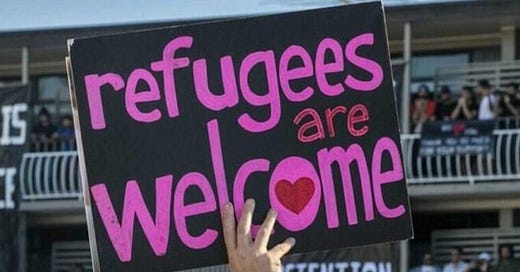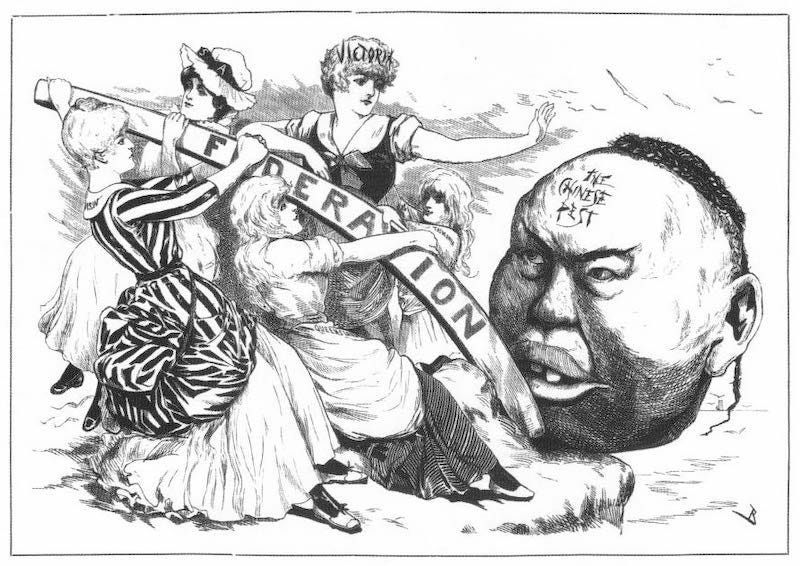The narrative surrounding asylum seekers and border protection in Australia frequently oscillates between humanitarian concern and stringent national security measures, often influenced by political motives rather than pragmatic or ethical considerations. This dichotomy was starkly illuminated by recent events involving the arrival of 43 asylum seekers from India, Bangladesh, and Pakistan in the remote Western Australian town of Beagle Bay. The political rhetoric that ensued exemplifies how the issue of asylum seekers is exploited for political capital, highlighting a broader discourse that oscillates between fear-mongering and calls for empathy and international responsibility.
The leader of the opposition, Peter Dutton—a prime agitator of this fear mongering— leveraged this event to criticise the current Labor government, asserting a breakdown in Australia’s border protection system under a “weak Prime Minister”. Dutton’s comments underscore a broader strategy employed by the Liberal Party to amplify the perceived threats associated with unauthorised arrivals, framing them as indicative of governmental incompetence and a lapse in national security.
This approach, however, is not without its contradictions. Dutton’s critique of the current government’s handling of border protection and asylum seekers starkly contrasts with the more reticent stance the Liberal Party adopted while in power, particularly regarding “on water matters,” and this discrepancy suggests a selective engagement with the issue, contingent on its utility for political positioning rather than a consistent policy approach.
Prime Minister Anthony Albanese’s response to Dutton’s accusations highlights a defensive stance against what is baseless fear campaigns. “He’s just wrong,” said the Prime Minister. “You know what he does every day you see it. It’s just fear campaigns every day, that don’t have a basis in what is going on. And he’s someone who is defined by being negative.”
Albanese’s remarks attempt to redirect the political discourse towards more pressing domestic issues, such as the cost of living, thereby challenging the opposition’s focus on border protection as a primary concern. This interaction between Dutton and Albanese reflects a broader political dynamic where the issue of asylum seekers is ensnared in a cycle of accusation and counter-accusation, often detached from the substantive realities and challenges of managing asylum and refugee protection.
The politicisation of asylum seekers and border protection in Australia also reveals a disjunction between the scale of the challenge faced by Australia and that encountered by other countries. The arrival of a single boat in Beagle Bay is juxtaposed against the backdrop of the global refugee crisis, where millions are displaced, and many countries grapple with far greater numbers of asylum seekers and refugees. This context underscores the extent to which political discourse in Australia around asylum seekers is disproportionately amplified, often obscuring the legal and humanitarian obligations Australia holds as a signatory to the UN Refugee Convention.
The strategic timing of the leak to the media—which appears to have come from the Australian Federal Police—concerning the arrival of asylum seekers, potentially aimed at influencing the Dunkley by-election, points to a cynical use of such events for electoral advantage. This practice is indicative of a broader political strategy that seeks to capitalise on border protection as a polarising issue, irrespective of the broader implications for asylum seekers’ rights and Australia’s international reputation.
The recent political skirmishes over the arrival of asylum seekers in Beagle Bay sheds light on the complex interplay between national security concerns, political opportunism, and Australia’s international obligations—which are usually given short shrift—a discourse characterised by hyperbolic rhetoric and political gamesmanship, which often serves to obscure the nuanced challenges of asylum and refugee protection. While this is unlikely to happen within the current structure of Australian politics, there is a need for a more measured, informed, and compassionate approach to asylum seekers and border protection.
Media manipulation and the politicisation of Border Force
The arrival of 43 asylum seekers in Beagle Bay not only reignited political debates but also underscored the racial undertones often associated with discussions of asylum in Australia. The emphasis on the asylum seekers’ countries of origin—India, Bangladesh and Pakistan—and implied racial characteristics speaks to a broader strategy of fear-mongering, which has been a staple in the political toolkit of certain conservative factions within the Australian political landscape.
The manipulation of media coverage and the suspected involvement of the Australian Federal Police in politicising the arrival of asylum seekers represent a significant departure from impartial governance and law enforcement. The suggestion that the Australian Federal Police might have been complicit in orchestrating media coverage to benefit the Liberal Party raises serious concerns about the independence and integrity of national security and law enforcement agencies. Such actions, if correct, not only undermine public trust in these institutions but also highlight the extent to which political agendas can infiltrate and influence the operations of entities that should remain apolitical.
The historical reluctance of former immigration ministers, such as Scott Morrison and Peter Dutton, to discuss “on water matters” while in government, juxtaposed with the eagerness to exploit these issues when politically convenient, illustrates a profound hypocrisy. This approach manipulates public perception of border security, transforming it into a political weapon rather than a matter of national or humanitarian interest. The selective transparency and strategic leaks to the media, particularly during sensitive political periods, such as elections or amidst scandals, reveal a calculated attempt to sway public opinion and electoral outcomes.
The role of the media and its relationship with law enforcement and political entities is also under scrutiny. The presence of media at sensitive operations before official actions are taken—as was the case with the anti-terror and union raids in 2017, even though no charges were ever laid—suggests a level of co-ordination between the Australian Federal Police and conservative politics that undermines the integrity of both the media and the police force. When media coverage is orchestrated to maximise political fallout for opponents, it ceases to be an independent fourth estate and becomes a tool in the political arsenal.
The call for a comprehensive reform of the Australian Federal Police, to purge it of perceived political biases and restore its credibility as an impartial law enforcement agency, is a monumental task. It underscores the need for transparency, accountability, and integrity within all branches of government and their associated agencies. Such reforms are not merely administrative but symbolic, representing a commitment to the principles of justice and impartiality that should underpin democratic institutions.
Reforming the Australian Federal Police and addressing the broader issues of media manipulation and the politicisation of asylum seekers require a concerted effort from all sectors of Australian society. It demands a re-evaluation of the values that Australia stands for on the international stage and a commitment to uphold these values. As the debate on asylum seekers continues, it is imperative that it is conducted with a focus on humanity, respect for international obligations, and a strong commitment to the principles of fairness and justice. Only through such a comprehensive approach can Australia navigate the complex interplay of national security, immigration policy, and human rights that defines the contemporary discourse on asylum seekers and border protection.
Navigating fear, media, and the quest for humanitarian principles
The weaponisation of asylum seekers in Australian politics is a multifaceted issue, deeply entwined with the nation’s political, media, and social landscapes. The portrayal of asylum seekers as a looming threat to national security, often amplified by media narratives, reflects a profound disconnect between the realities of asylum and the fear-driven rhetoric employed for political gain. This dissonance is particularly evident in the contrasting depictions of asylum seekers: on one hand, as individuals fleeing unimaginable hardships and seeking refuge, and on the other, as pawns in a broader political strategy designed to stoke public fear and secure electoral advantage.
The historical context provided by the discussions on past Australian Prime Ministers’ stances towards refugees, from Gough Whitlam’s initial hesitance to Malcolm Fraser’s more welcoming approach, highlights the evolving nature of Australia’s refugee policy. This evolution reflects broader global trends, where wealthier, predominantly Western nations exhibit increasing apprehension towards immigration and asylum seekers. The juxtaposition of Fraser’s openness on the issue in late 1970s with the subsequent politicisation of the issue, initially by the Howard government from 1998 onwards, and ramped up by the Abbott and Morrison governments after 2013, underscores a shift towards using asylum seekers as tools in political opportunism rather than addressing their plight as a humanitarian concern.
Anti-Asian sentiments peaked in the late 19th and early 20th centuries. The Melbourne Punch, May 1888.
The recurring theme of fear and xenophobia—evident in Australia since its racist imperialist project commenced in 1788—leveraged by political figures to consolidate power, undermines the potential for a rational and compassionate discourse on asylum. The suggestion that legislation could be introduced to prevent the politicisation of “on-water matters” underscores the need for structural changes to ensure that discussions around border security and asylum are conducted in a manner that prioritises human dignity and international obligations over political expediency, an expediency that is always exploited by conservatives.
In considering a path forward, it is essential to recognise the importance of depoliticising the asylum seeker issue and reframing it within a humanitarian, rather than a security-focused, context. This requires a concerted effort to dismantle the narratives of fear and threat that have been constructed around asylum seekers and to foster a more inclusive and empathetic understanding of their circumstances.
The Australian political landscape, particularly the Labor Party, faces a critical challenge in navigating these complex dynamics, balancing national security concerns with a commitment to humanitarian principles and international law.
The discussion surrounding asylum seekers in Australia should extend beyond mere policy considerations to touch upon fundamental questions about the nation’s identity, values, and place in the global community. There needs to be a re-evaluation of the principles guiding Australia’s approach to asylum and a renewed commitment to upholding the rights and dignity of those who seek refuge within its borders.
Only through such a re-evaluation can Australia hope to move beyond the divisive and dehumanising rhetoric that has characterised much of the debate on asylum seekers, towards a more compassionate and principled approach that recognises the shared humanity of all individuals, regardless of their origin or status.










